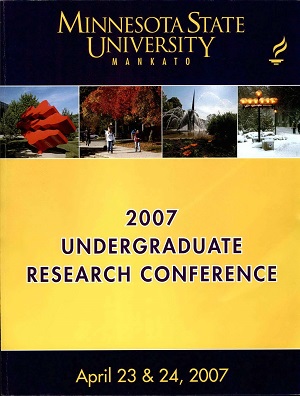Team Cohesion and Performance as a Product of Virtual Condition
Location
CSU 253/4/5
Start Date
24-4-2007 10:30 AM
End Date
24-4-2007 12:30 PM
Student's Major
Psychology
Student's College
Social and Behavioral Sciences
Mentor's Name
Andrea Lassiter
Mentor's Department
Psychology
Mentor's College
Social and Behavioral Sciences
Description
Dispersed teams connected by computer media are becoming a more important issue in organizations and academic settings. Recently, there has been an increase in the need for teams to work together to perform important tasks even though they may never actually meet face-to-face or may not be in the same location. As part of a larger study, this particular research examined the roles of task cohesion and social cohesion as they influence trust and performance effectiveness in virtual teams. This lab experiment used three different conditions in which groups were either face-to-face throughout the entire session; met first face-to-face and then were separated to work together; or were completely separated and never saw each other during the session. The experiment was concerned with the effects that these conditions would have on virtual group effectiveness. It was expected that 1) face-to-face groups would have the highest levels of cohesion; and 2) task cohesion would have higher effects on performance than social cohesion. Results of these research questions will be presented. In addition we will provide recommendations for future research examining cohesion, trust, and other psychological factors along with their influence on virtual team effectiveness.
Team Cohesion and Performance as a Product of Virtual Condition
CSU 253/4/5
Dispersed teams connected by computer media are becoming a more important issue in organizations and academic settings. Recently, there has been an increase in the need for teams to work together to perform important tasks even though they may never actually meet face-to-face or may not be in the same location. As part of a larger study, this particular research examined the roles of task cohesion and social cohesion as they influence trust and performance effectiveness in virtual teams. This lab experiment used three different conditions in which groups were either face-to-face throughout the entire session; met first face-to-face and then were separated to work together; or were completely separated and never saw each other during the session. The experiment was concerned with the effects that these conditions would have on virtual group effectiveness. It was expected that 1) face-to-face groups would have the highest levels of cohesion; and 2) task cohesion would have higher effects on performance than social cohesion. Results of these research questions will be presented. In addition we will provide recommendations for future research examining cohesion, trust, and other psychological factors along with their influence on virtual team effectiveness.
Recommended Citation
Vale, Melissa. "Team Cohesion and Performance as a Product of Virtual Condition." Undergraduate Research Symposium, Mankato, MN, April 24, 2007.
https://cornerstone.lib.mnsu.edu/urs/2007/poster-session-D/5




